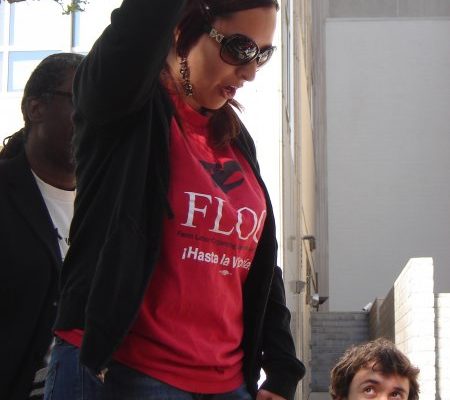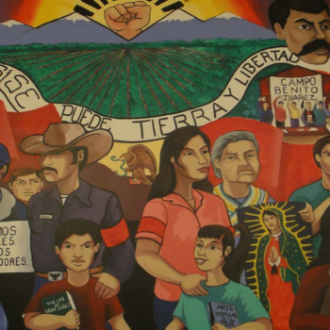
 Here is the most recent reflection written by Carson Putnam, NFWM’s Duke Divinity School Ministerial Intern this summer. Carson has been organizing people of faith in the Triangle to visit labor camps, accompanying organizers of the Farm Labor Organizing Committee (FLOC).
Here is the most recent reflection written by Carson Putnam, NFWM’s Duke Divinity School Ministerial Intern this summer. Carson has been organizing people of faith in the Triangle to visit labor camps, accompanying organizers of the Farm Labor Organizing Committee (FLOC).
Sustaining Hope: Gospel Resolve in Farm Worker Ministry
Recently I had the opportunity to take several volunteers on a visit to a labor camp in eastern North Carolina. Although earlier in the summer I visited a labor camp, the experience was different for me when taking volunteers. Whereas my first visit opened my eyes to why advocacy for farm worker justice is necessary, my second visit allowed me to reflect on the resolve found in the hearts of those who tirelessly toil for farm worker justice.
The purpose of my first visit to a farm laborer camp with the NFWM was to educate myself about the need for farm worker advocacy – I needed to see first-hand why the work of the NFWM is so important. My first visit allowed that opportunity. I met and spoke with farm workers who spoke about their troubles and grievances. At the same time, I heard about hope. I heard about the way that the Farm Labor Organizing Committee (FLOC) has helped farm workers with medical, familial, and visa problems. I heard how the contract that FLOC won during the Mount Olive Pickle campaign positively impacted working conditions and FLOC’s ability to work with growers and the H2A visa program. I heard about the positive effects of farm worker campaigns that the NFWM has supported for so long.
On my second visit, the volunteers that I took to visit a labor camp had been supporters of farm worker issues for years – even decades. The visit went well, and the volunteers were even able to meet Baldemar Velasquez, the president of FLOC. However, the most astonishing thing that I learned during that visit was that none of the volunteers that went with me had ever visited, or seen first-hand, a farm worker labor camp. The three volunteers that I accompanied that night possessed a wealth of knowledge about farm worker issues and an equally rich résumé of experience in farm worker advocacy. During the car ride to the labor camps and back I heard also from the volunteers about hope. I heard about how their labor in the struggle for farm worker justice had helped win union contracts with major corporations. I heard about their heart for farm workers.
Hearing about the struggle for farm worker justice from volunteers was just as formative an experience as seeing the conditions at labor camps. After that visit, I began to wonder. How can we continue to press on in the face of adversity throughout so many years in the struggle for farm worker justice? Where do we find the resolve to continue the struggle throughout the years? As I wrestled with these questions, I realized that the answer had been obvious the entire time – the effect of the Gospel of Jesus Christ.
Christ did not educate his disciples and fellow Israelites and stop there. He did not begin a discussion about how to relate to neighbors and how to treat each other for the sake of the discussion. He did not talk about hope and sit idly by while he waited for his fellow Israelites to accept his Word. He acted. Christ asserts that acting out of love for the Lord and love for neighbor is the foundation of the Law and the Prophets (Matt. 22:37-40). Christ does not educate us about social issues and leave us to make up our own minds to act. He upends social orders (Matt. 5, Lk. 6:20-49) and calls us to a higher righteousness (Matt. 5:48). He calls us to act out of love for Him, the Father, the Holy Spirit, and our neighbors (Matt. 22:37-40). Throughout the New Testament it is evident that we are to not sit idly and wait for others to act. We must act. The author of James famously asserts that “faith by itself, without works, is dead” (2:12). What is James saying? He echoes the same idea to which Christ calls us – an orthopraxy that flows out of orthodoxy. That is, faith leads to action.
Action in response to the Gospel is what I have witnessed during my time here at the NFWM. It is also the difference between what I learned on my two visits. Whereas on my first labor camp visit I witnessed first-hand the need for the NFWM’s ministry, on my second visit I witnessed the resolve required to act in the struggle for farm worker justice. The tireless toil shown over the years by the volunteers I accompanied on a visit, those who work with the NFWM, and those who work in the Church seeking farm worker justice is evidence of Christ’s Gospel. Because we have faith, we must act. Because we have faith, we will be sustained in our action.
Carson Putnam, 22 July 2015



